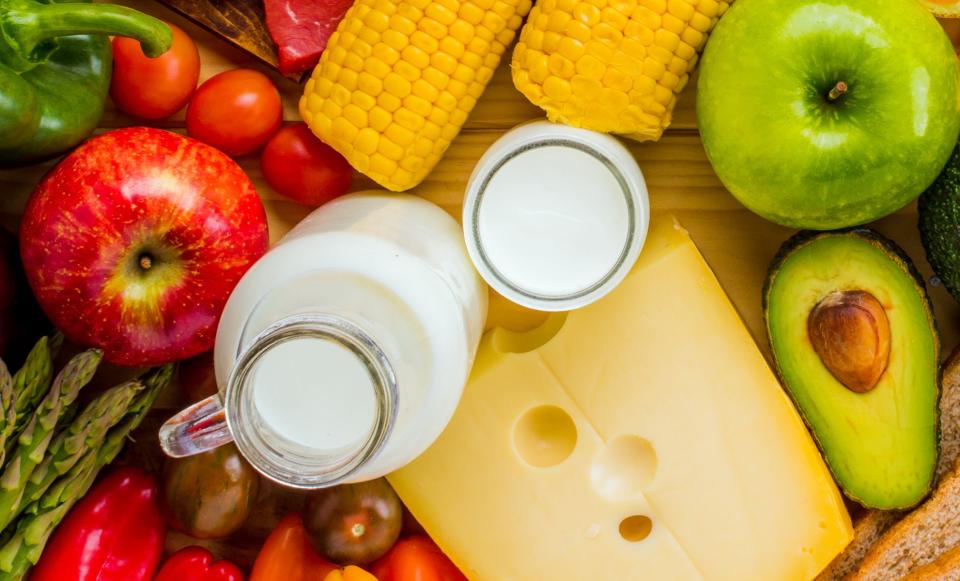Leading health authorities highlight healthy eating habits as a priority to help manage high blood pressure and heart disease risk. Hypertension Canada and the Heart and Stroke Foundation recommend the DASH diet to manage and reduce the risk of developing high blood pressure.1,2
The DASH diet is a healthy eating pattern that includes 8 to 10 servings of vegetables and fruits and 3 servings of milk products every day.3-5 This evidence-based diet emphasizes potassium, magnesium and calcium, three minerals that play a role in healthy blood pressure control. It also includes foods that provide protein and fibre such as whole grains, legumes, nuts and seeds.
The original DASH diet study
The original landmark DASH diet study published in 1997 showed that the DASH diet reduced blood pressure twice as much as a diet high in vegetables and fruit, but low in milk products.3 The DASH diet included about 2 servings of low-fat dairy foods (milk and yogurt) and about 1 serving of regular-fat dairy (cheese), as well as 8 to 10 servings of vegetables and fruit daily.4
In practice
Health authorities such as Hypertension Canada and the Heart and Stroke Foundation recommend the DASH diet to help prevent and manage high blood pressure.1,2
- The DASH diet is a healthy dietary pattern that emphasizes vegetables, fruit and milk products.3-5
- Extensive evidence shows that DASH diet is the most effective dietary approach to reduce blood pressure.6-8
- Several variations of the DASH diet have been shown to be effective, including one with high-fat instead of low-fat dairy foods.5,9,10
Recent evidence
Studies have found that the DASH diet is more effective for lowering blood pressure than other diets including low-sodium and Mediterranean diets.6-8 A 2020 review, that examined all of the available evidence on many different dietary patterns, confirmed the DASH diet, high in vegetables, fruits and dairy foods, was associated with the greatest overall reduction in blood pressure.7 Another 2019 review also found the DASH diet to be the most effective diet to lower blood pressure in people with high blood pressure as well as those who are pre-hypertensive.8
Modified DASH-style diets
A number of studies have also demonstrated that modified DASH-style diets can be as effective as a standard DASH diet in terms of blood pressure lowering.5-7 That is when the core components of the original DASH diet, such as servings of vegetables and fruits and milk products, are retained. These modified DASH-style diets allow for more flexibility in food choices to suit personal preferences.
The OmniHeart study compared the effects of different variations of the DASH diet. This study found that replacing some carbohydrates with protein or unsaturated fat, in a DASH-like diet, led to similar or greater reductions in blood pressure as the standard DASH diet.9 These DASH diet variations also improved blood lipids.
The BOLD diet study found that DASH-style diets that included lean beef effectively lowered blood pressure and improved blood lipids to a similar extent as a standard DASH diet.10
Another study compared the effects of a high-fat version of the DASH diet, including high-fat dairy instead of low-fat dairy, to a standard DASH diet.5 The high-fat version compensated for higher fat by lowering energy from carbohydrates primarily by reducing sugars from fruit juices. This study found that the high-fat version of the DASH diet lowered blood pressure as much as the standard DASH diet, without having an adverse effect on blood cholesterol levels.
Watch the webinar on the DASH diet here.
References
- Hypertension Canada. 2020. Comprehensive guidelines for the prevention, diagnosis, risk assessment, and treatment of hypertension in adults and children. Chapter VI. Health behaviour management. www.hypertension.ca. Accessed October 12, 2021.
- Heart and Stroke Foundation of Canada. 2021. Managing your blood pressure. www.heartandstroke.ca. Accessed October 12, 2021.
- Appel LJ et al. A clinical trial of the effects of dietary patterns on blood pressure. DASH Collaborative Research Group. N Engl J Med 1997;336:1117-1124.
- Karanja NM et al. Descriptive characteristics of the dietary patterns used in the Dietary Approaches to Stop Hypertension Trial. DASH Collaborative Research Group. J Am Diet Assoc 1999;99:S19-27.
- Chiu S et al. Comparison of the DASH (Dietary Approaches to Stop Hypertension) diet and a higher-fat DASH diet on blood pressure and lipids and lipoproteins: a randomized controlled trial. Am J Clin Nutr 2016;103:341-347.
- Gay HC et al. Effects of different dietary interventions on blood pressure: systematic review and meta-analysis of randomized controlled trials. Hypertension 2016;67:733-739.
- Sukhato K et al. Efficacy of different dietary patterns on lowering of blood pressure level: an umbrella review. Am J Clin Nutr 2020;112:1584-1598.
- Schwingshackl L et al. Comparative effects of different dietary approaches on blood pressure in hypertensive and pre-hypertensive patients: A systematic review and network meta-analysis. Crit Rev Food Sci Nutr 2019;59:2674-2687.
- Swain JF et al. Characteristics of the diet patterns tested in the optimal macronutrient intake trial to prevent heart disease (OmniHeart): options for a heart-healthy diet. J Am Diet Assoc 2008;108:257-265.
- Roussell MA et al. Beef in an Optimal Lean Diet study: effects on lipids, lipoproteins, and apolipoproteins. Am J Clin Nutr 2012;95:9-16.



